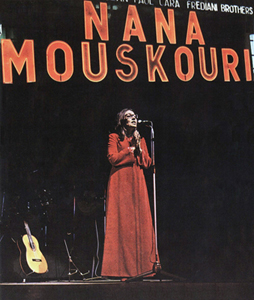

Olympia 1967
 |
Olympia 1967 |
A BIT OF HISTORY Inaugurated in 1893, the Olympia is the oldest still-active concert hall of Paris. After its restoration in 1954, the songwriter Bruno Coquatrix became the director. He invited the big names of French and International music to perform there. Among them were Brassens, Piaf, Hallyday, Brel, the Beatles, the Rolling Stones and Dylan. Bécaud and Dalida also made their debut on that stage. In a few years, the Olympia of Paris became the most famous music hall, not only of France and Europe but also in the world. |
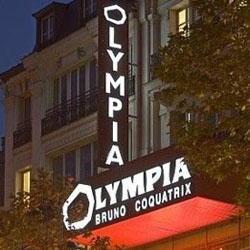 |
In May 1961, during her second stay in Paris, Nana discovered that theater. Louis Hazan, CEO of Philips records, wishing to introduce her to the French variety, took her to see Edith Piaf. Nana was overwhelmed and at the end she doubted herself. She left the hall crying but Mr. Hazan reassured her. He showed her the red neon lights saying that one day her name will be written with the same big letters.
FROM 1962 TO 1967
That announcement was partly concretized when Nana performed for the first time on that stage in December 1962. She sang during 20 minutes in the first part of Georges Brassens concert. At that time, the star of the evening only performed in the second part. It took place in 1964 at Bobino and in 1966 at La Tête de L'Art. With these three appearences in the City of Lights, Nana adapted her French repertoire and her audience expanded gradually.
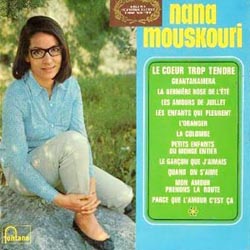 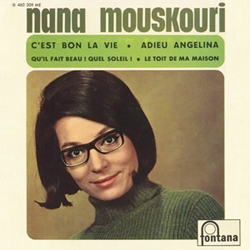 |
It was not until the spring of 1967 that Nana got the expected success in France. Her album "Le cœur trop tendre" won the Grand Prix de l'Académie Charles Cros. Her TV appearances were multiplying and her records played more on the radio. Then her latest EP including two hits: "C'est bon la vie" and "Adieu Angelina" was released. |
INVITATION OF BRUNO COQUATRIX
While she was on a summer tour through France, Mr Coquatrix called her back. He offered her to give headlined concerts. Gilbert Bécaud had just canceled his three-week run in October. Nana was surprised but she hesitated because she didn't feel ready. And at that moment, she will be five months pregnant. It was her decision. But her producer André Chapelle, reassured her by saying that her repertoire was well rounded and that all the mother will be on her side.
To ensure the seats rental, Mr. Coquatrix hired a very famous entertainer and singer, Jacques Martin. During the first part, he will present a variety show with Jean-Paul Cara, Ballets Arthur Plasschaert, Estella Blain, the Frediani Brothers, Serge Lama and François Raubert who conducts Olympia's big orchestra.
CONCERT UNDER PREPARATION
Nana thought about it because singing at the Olympia is the dream of any artist who wants to launch his career in France. Finally, she accepted. By the end of her tour, Nana finished recording her new album "Le jour où la colombe ..." and decided the program of that Olympia. As the concert lasts one hour, she will perform 16 songs: six from her latest album, six of her hits and four in Greek. As the opening song, Nana chosed "Telalees" (The town crier) she had sung in a Danny Kaye TV show in the United States.
The Athenians, the ensemble of her recent tour in Quebec and in France, will share the stage with her. In addition to playing their instruments, they will accompany her while singing: Giorgos Petsilas, with guitar and bouzouki; Philippos Papatheodorov, with guitar, Costas Trouptsios, with bass, and Spyridon Livieratos, with drums.
For her stage costume, Nana appealed to the Norwegian designer Per Spook. To conceal her pregnancy, he drew a long and loose tunic. That red velvet dress embroidered with stones around the neck, on the chest and the wrists enhances the complexion of her face. And the musicians will wear a black tuxedo with a white shirt.
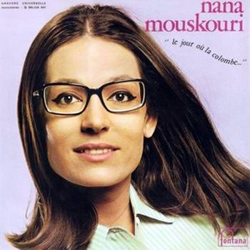
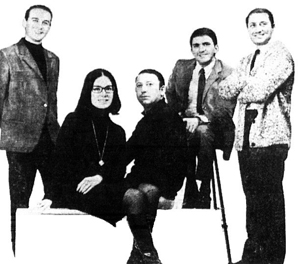
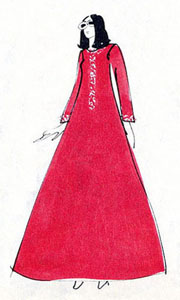
CONSECRATED BY PARIS
On October 26, the opening night, Nana lived through hours of anguish. In her dressing room, she wondered if she would succeed, convince. She felt that she was risking her life and dreaded the moment when she will have to get out from there. Images of condemned people on death row haunted her. When the time came, Mr Coquatrix took her with him. Like every premiere, he accompanied his star by the arm and led him to the stage. Serge Lama saw her going by. Later he will tell her that she looked like a sheep being led to the slaughterhouse. But as soon as she walked towards her microphone, the warm applause made her find the serenity, the happiness to be on stage.
Yet that evening Nana was, as we say, consecrated by Paris. Although that audience is reputed to be difficult, the spectators reacted with enthusiasm. They were charmed by her distinction, her voice and her repertoire. Among the titles interpreted, many were moved by "Le jour où la colombe ..." dedicated to those who have lost their freedom. The musical and vocal complicity of her musicians enhanced her singing recital. If we believe the comments of those who attended her concert, her triumph will remain in the memoirs of the prestigious theater. When after countless encores, Nana came back to sing "Le temps des cerises", the spectators were standing up and listened to her fervently. From her last note, an indescribable emotion took over the audience that gave her an endless ovation. Everyone had just witnessed a great moment of French Song. Fully satisfied by her performance, Bruno Coquatrix predicted a big career. According to him, she was established for the next 25 years.
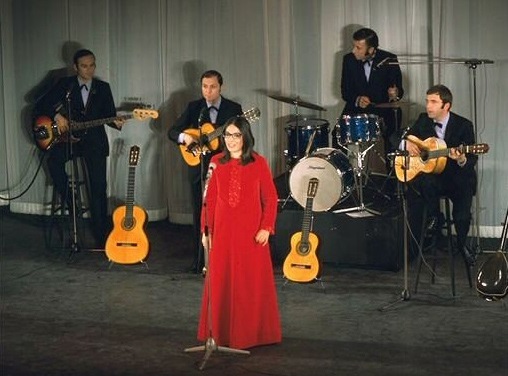
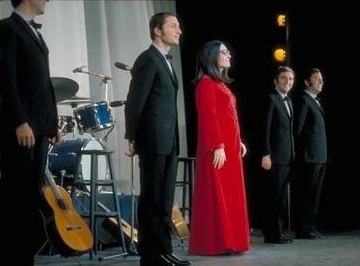
Until then, her name had never been so mediatized and she received most eulogistic reviews :
Jacqueline Cartier : « This is the sweet, the transparent Nana, without any tricks, quite simple, who sings as [Rudolf] Noureev dances, because that is what she was born to do... » (France-Soir, October 28, 1967)
Odile Grand : « ... And Nana’s voice flows, climbs to the highest peaks, delightfully becomes husky in the low notes, all that, it seems, without any effort, Nana doesn’t stop smiling. Or being serious if the song is so... » (L'Aurore, October 28 and 29, 1967)
Danièle Heymann : « ... In the tensing cacophony of the French Music Hall, is raising without screaming Nana Mouskouri's little night music. » (L'Express, October 30, 1967)
Claude Sarraute: « ... With Nana Mouskouri, the Olympia becomes like Pleyel. Her voice is a crystal, a spring, a velvet; her songs are beautiful, simple and passionate... » (Le Monde, October 31, 1967)
Philippe Adler : « Today, today where finally in France we listen to Nana, just three words: Welcome Nana and… a thousand excuses for the delay!… » (Rock et Folk, November 1967)
René Bourdier : « The singing art has its sovereigns. We can brag for having attended the consecration of the latest one: Ms. Nana Mouskouri... And like to thank Paris, this Paris yet so small for such a great voice, she comes, after the encores, to lay as a gift in the basket of their royal weeding the most touching of her latest « creations »: Le temps des cerises... » (Lettres françaises, November 1st, 1967)
Nicolas de Rabaudy : « She is the charm, the grace, the modesty, the feminity… her singing recital is wonderful. We must see her in concert: it's an enchantment for the eyes, the ears. And the heart. » (Paris Match, November 4, 1967)
The audience and the press recognition allowed her at the same time to provide a new image of herself, more joyful. Nana who used to wear black dresses, this time chose a red one. In addition, she became the first woman who sang in this theater pregnant and wearing glasses. We called her Nana and on her next records, only the first name will appear. From then on she was considered as a national singer.
FIRST LIVE ALBUM
Like most of the record companies, Philips keep audio archives of their artists. Following Nana's triumph, they decided to release that concert on record. So, "À l'Olympia" became her first live album to be marketed. It will be pressed in seven countries. It is probably for reasons of space on the vinyl that 13 songs have been kept. The three missing ones are "Le cœur trop tendre", "Les parapluies de Cherbourg" and "C'est bon la vie".
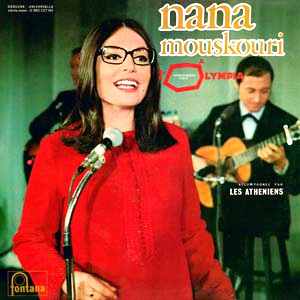 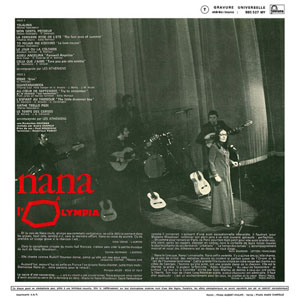 |
|
That record is from a time when the concerts were not released on video. For that reason, we must listen to it by letting ourselves carry by the music, the voice and the audience reaction. And we manage to create our own images, like when we read a novel. For those who were not present, the cover gives us an idea of it. On the cover, Nana is turned towards the courtyard and smiles while singing. Located on the edge of the stage, the photographer Jacques Aubert found the perfect angle. The picture of the back cover, taken from the left mezzanine, is the work of André Chapelle. It gives us a very beautiful view of the stage.
MYTHICAL AND FETISH HALL
The evening when she discovered Edith Piaf, Nana saw how an artist can conquer an audience. The Olympia thus became for her a symbol of consecration. Six years later, in her turn, she lived these extraordinary moments with her fans. As her career really took off in France, the following year, she gave about sixty concerts. In October 1969, Coquatrix invited her again, this time to ensure both parts of the evening. That mythical venue where so many artists performed has become Nana's favorite concert hall. Throughout her career, she will appear 12 times.
THE OLYMPIA 1967 MARKED AN IMPORTANT STEP IN NANA'S CAREER. WHY? She sang for the first time as top of the bill artist in Paris' most famous concert hall. It was a triumph and the reviews were unanimous. That performance at the Olympia is mentioned in all the biographical texts and it came out on record. Finally, the City of Light is considered like a starting point for her world conquest. |